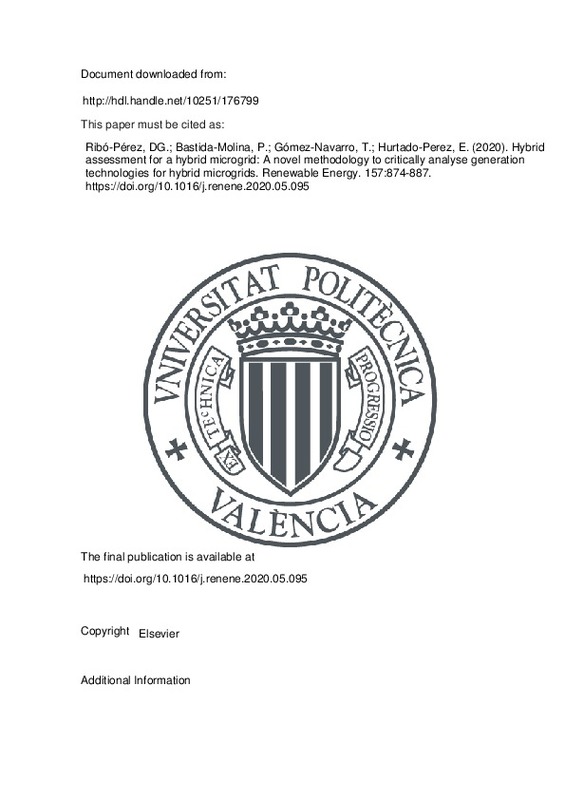JavaScript is disabled for your browser. Some features of this site may not work without it.
Buscar en RiuNet
Listar
Mi cuenta
Estadísticas
Ayuda RiuNet
Admin. UPV
Hybrid assessment for a hybrid microgrid: A novel methodology to critically analyse generation technologies for hybrid microgrids
Mostrar el registro sencillo del ítem
Ficheros en el ítem
| dc.contributor.author | Ribó-Pérez, David Gabriel
|
es_ES |
| dc.contributor.author | Bastida-Molina, Paula
|
es_ES |
| dc.contributor.author | Gómez-Navarro, Tomás
|
es_ES |
| dc.contributor.author | Hurtado-Perez, Elias
|
es_ES |
| dc.date.accessioned | 2021-11-10T19:05:49Z | |
| dc.date.available | 2021-11-10T19:05:49Z | |
| dc.date.issued | 2020-09 | es_ES |
| dc.identifier.issn | 0960-1481 | es_ES |
| dc.identifier.uri | http://hdl.handle.net/10251/176799 | |
| dc.description.abstract | [EN] Eighty per cent of the people without access to electricity live in rural areas. Due to high investment costs in the grid, the solution to providing electricity to these people will mainly rely on the installation of islanded hybrid microgrids. Designers need to consider a variety of factors for the optimal design of hybrid microgrids. However, many of these criteria are qualitative or uncertain. This paper provides a novel methodology to assess the influence of such criteria in the design of a Hybrid Microgrid of Renewable Energy Sources (HRES). The method combines context analysis, literature review and the Analytic Network Process (ANP) through panels of experts and surveys. The methodology ranked the criteria and helped to design a HRES in an isolated Honduran rural community in the Mesoamerican Dry Corridor. The study presents a review and classification of the main criteria and energy technologies considered for the design of HRESs in rural communities. The most influential factors turned out to be the institutional support, the possible expansion of the grid to the community and the availability of local energy resources. Regarding energy technologies, photovoltaic and wind power ranked as the preferred followed by a biomass gasifier as backup. | es_ES |
| dc.description.sponsorship | This is an extended and updated version of a paper originally presented at the 14th Conference on Sustainable Development of Energy, Water and Environment Systems (SDEWES 2019) held in Dubrovnik, Croatia over the period 1st to 6th October 2019 (denoted then as paper SDEWES2019.0565 - Choosing the best configuration for a hybrid microgrid of renewable energy sources by means of the analytic network process). This work was supported in part by the Spanish public administration under grant FPU2016/00962, by the regional public administration of Valencia under grant ACIF/2018/106, by the Food and Agriculture Organisation under the Letter of Agreement (PO number: 332412). And finally, by the Catedra de Transicion Energetica Urbana (Las Naves-UPV). | es_ES |
| dc.language | Inglés | es_ES |
| dc.publisher | Elsevier | es_ES |
| dc.relation.ispartof | Renewable Energy | es_ES |
| dc.rights | Reserva de todos los derechos | es_ES |
| dc.subject | Hybrid microgrids | es_ES |
| dc.subject | Renewable energy | es_ES |
| dc.subject | ANP | es_ES |
| dc.subject | Rural electrification | es_ES |
| dc.subject.classification | INGENIERIA ELECTRICA | es_ES |
| dc.subject.classification | PROYECTOS DE INGENIERIA | es_ES |
| dc.title | Hybrid assessment for a hybrid microgrid: A novel methodology to critically analyse generation technologies for hybrid microgrids | es_ES |
| dc.type | Artículo | es_ES |
| dc.identifier.doi | 10.1016/j.renene.2020.05.095 | es_ES |
| dc.relation.projectID | info:eu-repo/grantAgreement/MECD//FPU16%2F00962/ES/FPU16%2F00962/ | es_ES |
| dc.relation.projectID | info:eu-repo/grantAgreement/FAO//332412/ | es_ES |
| dc.relation.projectID | info:eu-repo/grantAgreement/GENERALITAT VALENCIANA//ACIF%2F2018%2F106//AYUDA PREDOCTORAL GVA-BASTIDA MOLINA/ | es_ES |
| dc.relation.projectID | info:eu-repo/grantAgreement/AECID//2019_ACDE_000842//Microred Inteligente Híbrida de Energías Renovables para solucionar el Trilema Agua-Alimentación-Energía en una comunidad rural de Honduras / | es_ES |
| dc.rights.accessRights | Abierto | es_ES |
| dc.contributor.affiliation | Universitat Politècnica de València. Departamento de Ingeniería Eléctrica - Departament d'Enginyeria Elèctrica | es_ES |
| dc.contributor.affiliation | Universitat Politècnica de València. Departamento de Proyectos de Ingeniería - Departament de Projectes d'Enginyeria | es_ES |
| dc.description.bibliographicCitation | Ribó-Pérez, DG.; Bastida-Molina, P.; Gómez-Navarro, T.; Hurtado-Perez, E. (2020). Hybrid assessment for a hybrid microgrid: A novel methodology to critically analyse generation technologies for hybrid microgrids. Renewable Energy. 157:874-887. https://doi.org/10.1016/j.renene.2020.05.095 | es_ES |
| dc.description.accrualMethod | S | es_ES |
| dc.relation.publisherversion | https://doi.org/10.1016/j.renene.2020.05.095 | es_ES |
| dc.description.upvformatpinicio | 874 | es_ES |
| dc.description.upvformatpfin | 887 | es_ES |
| dc.type.version | info:eu-repo/semantics/publishedVersion | es_ES |
| dc.description.volume | 157 | es_ES |
| dc.relation.pasarela | S\413506 | es_ES |
| dc.contributor.funder | GENERALITAT VALENCIANA | es_ES |
| dc.contributor.funder | MINISTERIO DE EDUCACION | es_ES |
| dc.contributor.funder | Food and Agriculture Organisation | es_ES |
| dc.contributor.funder | Universitat Politècnica de València | es_ES |
| dc.contributor.funder | AGENCIA ESPAÑOLA DE COOPERACION INTERNACIONAL | es_ES |
| dc.subject.ods | 07.- Asegurar el acceso a energías asequibles, fiables, sostenibles y modernas para todos | es_ES |
| dc.subject.ods | 13.- Tomar medidas urgentes para combatir el cambio climático y sus efectos | es_ES |
| dc.subject.ods | 01.- Erradicar la pobreza en todas sus formas en todo el mundo | es_ES |







![[Cerrado]](/themes/UPV/images/candado.png)

